Trauma-Informed Child Welfare (TICW) Resources
Since 2007, the Chadwick Center has been actively involved in several initiatives designed to support child welfare systems in becoming trauma-informed entities. In 2010, the National Advisory Committee for Chadwick’s Trauma-Informed Systems Project (CTISP, funded by the Substance Abuse and Mental Health Services Administration) defined a trauma-informed child welfare system as:
One in which all parties involved recognize and respond to the varying impact of traumatic stress on children, caregivers, families, and those who have contact with the system. Programs and organizations within the system infuse this knowledge, awareness, and skills into their organizational cultures, policies, and practices. They act in collaboration, using the best available science, to facilitate and support resiliency and recovery.
This page highlights the resources that have been created by the Chadwick Center to support child welfare systems in becoming more trauma-informed.
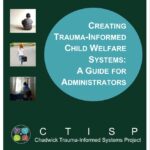 Creating Trauma-Informed Child Welfare Systems: A Guide for Administrators was designed as a tool for administrators across the child welfare and other child-serving systems who are interested in having their systems become more trauma-informed and responsive to the needs of children and families within the child welfare system who have experienced traumatic events.
Creating Trauma-Informed Child Welfare Systems: A Guide for Administrators was designed as a tool for administrators across the child welfare and other child-serving systems who are interested in having their systems become more trauma-informed and responsive to the needs of children and families within the child welfare system who have experienced traumatic events.
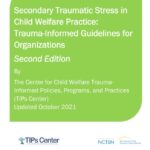 Secondary Traumatic Stress in Child Welfare Practice: Trauma-Informed Guidelines for Organizations is a resource designed to help child welfare agencies both prevent and mitigate the impact of secondary traumatic stress within their organizations throughout the entire recruiting, hiring, and retention phases.
Secondary Traumatic Stress in Child Welfare Practice: Trauma-Informed Guidelines for Organizations is a resource designed to help child welfare agencies both prevent and mitigate the impact of secondary traumatic stress within their organizations throughout the entire recruiting, hiring, and retention phases.
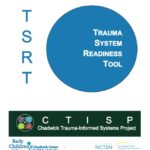 The Trauma System Readiness Tool (TSRT) is a community assessment tool that can be completed by individuals within the child welfare workforce to determine the trauma-informed nature of their system. The resource includes the TSRT and guidelines for scoring.
The Trauma System Readiness Tool (TSRT) is a community assessment tool that can be completed by individuals within the child welfare workforce to determine the trauma-informed nature of their system. The resource includes the TSRT and guidelines for scoring.
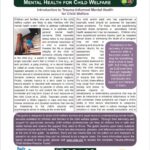 Desk Guide on Trauma-Informed Mental Health for Child Welfare is designed to assist child welfare workers and supervisors in understanding mental health services available for children in the child welfare system. Through their advocacy and support for appropriate services, child welfare professionals can help all children live in safe and stable homes and receive the support they need to thrive.
Desk Guide on Trauma-Informed Mental Health for Child Welfare is designed to assist child welfare workers and supervisors in understanding mental health services available for children in the child welfare system. Through their advocacy and support for appropriate services, child welfare professionals can help all children live in safe and stable homes and receive the support they need to thrive.
 Desk Guide on Trauma-Informed Child Welfare for Child Mental Health Practitioners is designed to assist child mental health professionals in increasing their knowledge of the policies, practices, and culture of the child welfare system. This increased understanding will assist both child welfare and child mental health providers in delivering the best services for the children and families they see.
Desk Guide on Trauma-Informed Child Welfare for Child Mental Health Practitioners is designed to assist child mental health professionals in increasing their knowledge of the policies, practices, and culture of the child welfare system. This increased understanding will assist both child welfare and child mental health providers in delivering the best services for the children and families they see.
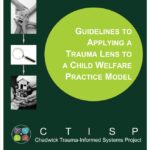 Guidelines for Applying a Trauma Lens to a Child Welfare Practice Model was designed to be a resource for child welfare agencies as they strive to update or articulate their current practice model. The guidelines will provide concrete strategies on how to update the common aspects of a practice model so that it may become more trauma-informed.
Guidelines for Applying a Trauma Lens to a Child Welfare Practice Model was designed to be a resource for child welfare agencies as they strive to update or articulate their current practice model. The guidelines will provide concrete strategies on how to update the common aspects of a practice model so that it may become more trauma-informed.
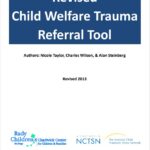 The Child Welfare Trauma Referral Tool (CWT) is a provider-completed tool designed to help child welfare workers make more trauma-informed decisions about the need for referral to trauma-specific and general mental health services. It is designed to be completed by the child welfare worker following a thorough record review and interview with key informants in the child’s life. The CWT was originally developed in 2006 and revised in 2013.
The Child Welfare Trauma Referral Tool (CWT) is a provider-completed tool designed to help child welfare workers make more trauma-informed decisions about the need for referral to trauma-specific and general mental health services. It is designed to be completed by the child welfare worker following a thorough record review and interview with key informants in the child’s life. The CWT was originally developed in 2006 and revised in 2013.
